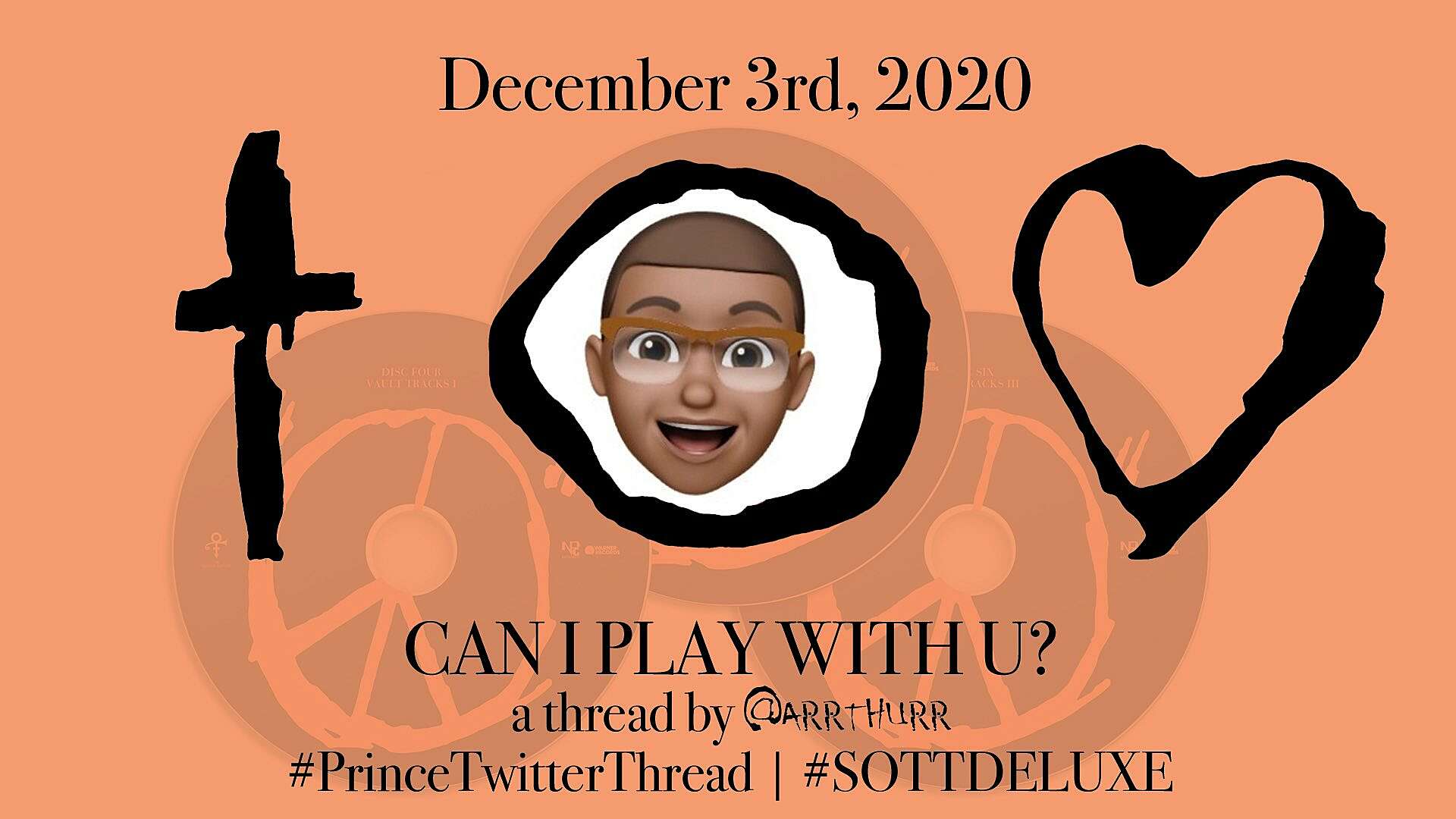
Miles Davis was a Prince fan.
I'm Arthur, host of The Music Snobs podcast, and we're going to discuss the Prince and Miles Davis collaboration "Can I Play With U?" from the truly massive Sign 'O' the Times box set. There's a lot to cover – and it starts with Miles.
DISCLAIMER: I'm going to use the word "jazz" throughout this thread, because it's 4 characters and you'll know I mean. But know that it's a poor title for the style of music that Miles played.
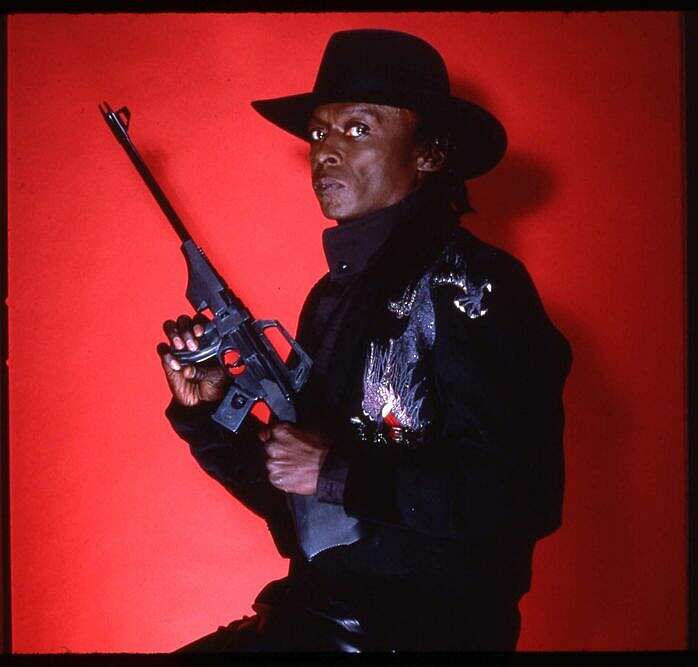
I don’t remember the first time I heard the name Miles Davis, but I do recall when Prince mentioned him in a 1985 Rolling Stone cover story. Prince talked about critics lambasting artists who try something different, referring to Miles specifically while playing the You're Under Arrest album. Back then, at 14, I only knew that Miles was a jazz trumpeter who played rock in the 1970's – something about "fusion" – and pissed off a legion of other jazz artists because of it. So if Prince mentioned him and played his records, then I had to get familiar.
I found my mom's copy of 1970's Bitches Brew … and I didn't last 5 minutes (Side 1, for example, comprises only two, very long songs). Sonically, it was like putting my hand on a hot stove – I couldn't make any sense of what I was hearing as this was the most advanced music I'd ever encountered. It was a whole year before I attempted another Miles Davis album, partly due to Prince keeping my interest up by adding an Easter egg in Under the Cherry Moon.
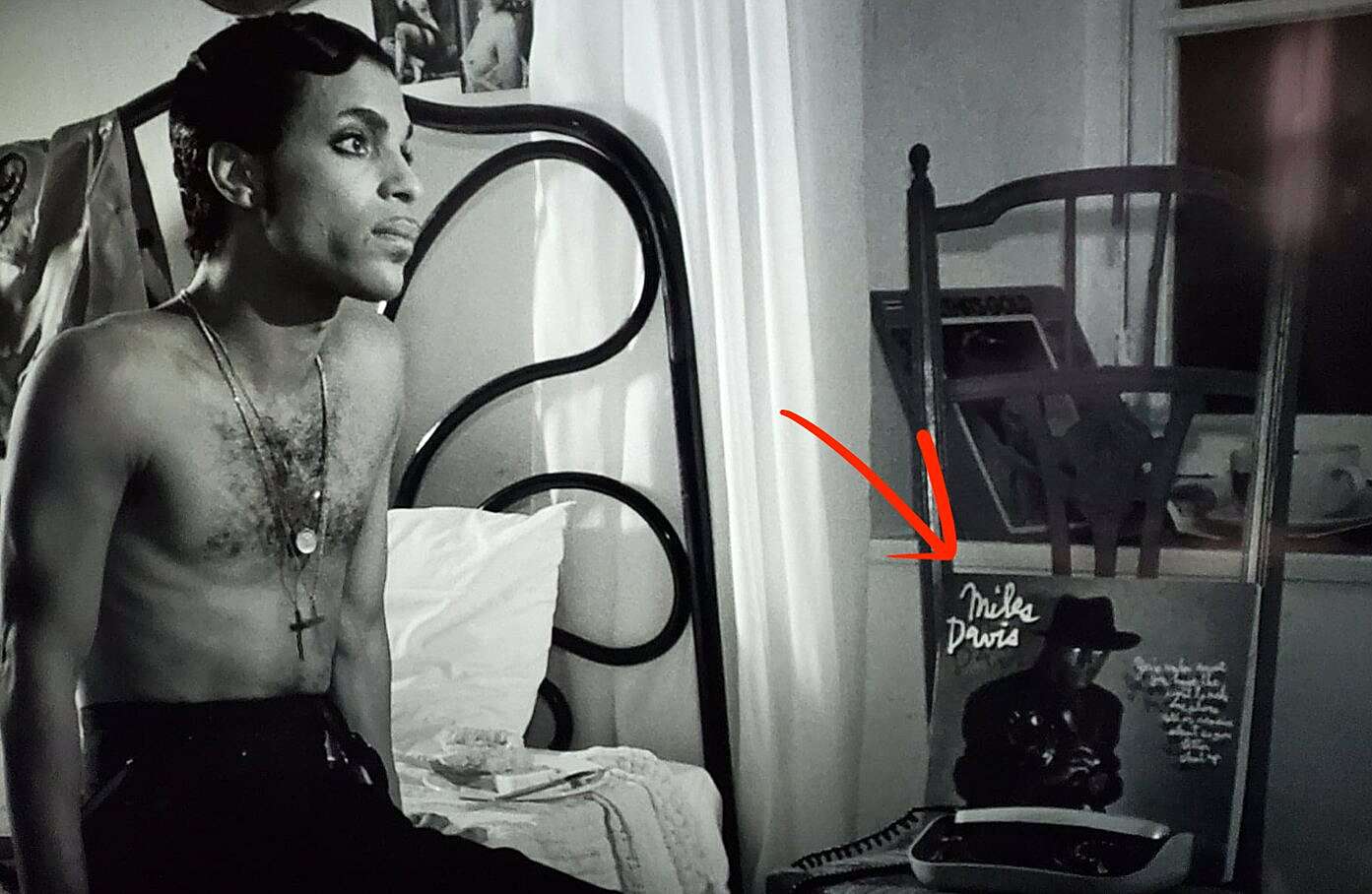
Not that I have to remind anyone that Prince was on fire in 1985, but Miles was having his own resurgence in popularity. He appeared in a Miami Vice episode, and was part of a print and televised campaign for trendy Honda Elite scooters (wherein he only says 12 words). I'll steer this back to Prince, but it's important to understand that Miles Davis was a force all of his own. He literally made other musicians want to play better when they were in his presence.
As I said at the outset, Miles was a Prince fan, and even added a photo of P in his 1990 autobiography. Miles' son, Erin, spoke of a time when he was learning to play drums, and his father gave him a copy of 1999 and told Erin, "Go learn how to play this."
Erin Davis gave another account of his father's admiration. "He adored Prince … that was his man."
Anyway, 1985 brought Miles to the Warner Bros. label after a 30 year relationship with Columbia, during which he made several classic albums and assembled what's arguably the greatest band in the history of improvisational music with Herbie Hancock, Wayne Shorter, Ron Carter & Tony Williams).
The WB move became an opportunity to get Prince involved with Miles’ next project. It's unclear who made the offer, but Alan Leeds describes their first meeting to Andrea Swensson in a podcast (around the 11:10 mark).
Prince sent Miles a tape w/ a note: "I can tell just from listening 2 ur music that U and I are so exactly alike…whatever U play would be what I’d do." After some back and forth tape exchanges, they have a finished song — that doesn't make the WB debut, "Tutu" released Sept '86.
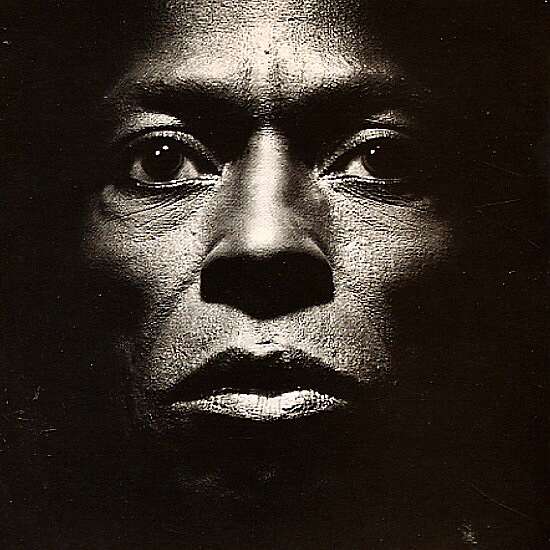
Now, at the time I had no expectation that Prince would be involved in Tutu, so I was happily surprised to hear Miles' horn on "Red Riding Hood" – a mislabeling of "Can I Play With U?" – on a 1990 bootleg release, Crucial: with Miles Davis & friends.
Side note A: For those of you that have Crucial and are unaware, "The H Man" is actually the title track to Miles' Amandla released in 1989. Prince neither composed the piece or participated in its recording.
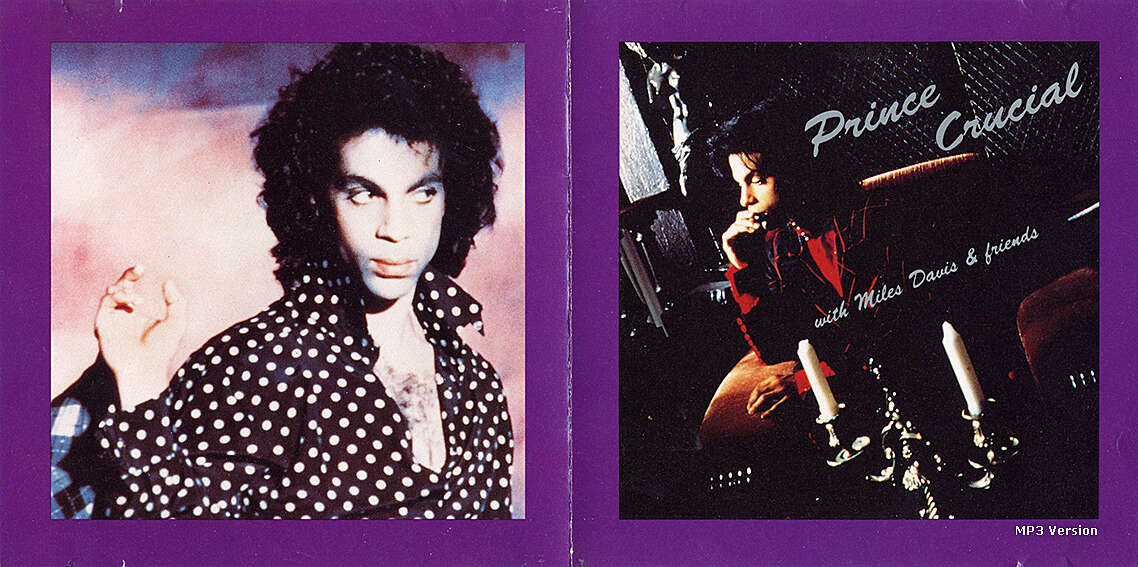
All right, let's talk about "Can I Play with U?” (hereafter, CIPWU?). Admittedly, it's not a favorite of mine, but I'll discuss it objectively, because there are some interesting things about it.
First, whereas his usual M.O. would be to pull something off the shelf, Prince wrote it specifically for Miles Davis. The lyrics, essentially about picking up a woman at a party, are pretty uninspired when compared to the vein of material he recorded during this period. (See "Sexual Suicide")
That said, CIPWU? would have been released with P's vocal on an, otherwise, instrumental album. And that seemed to be a conscious decision on Miles' and/or his producer Marcus Miller's part as Prince submitted a version of the song sans vocals.
The released version of CIPWU? includes bass (Miller) and keyboard (Adam Holzman) overdubs. While the bass line is the same as what Prince submitted, the keys all but replace Eric Leeds' tenor sax line during the chorus.
And that wasn't the only thing done to make the song fit Tutu. As funky as CIPWU? is, the album’s tone was of a slower groove, so Miller wrote "Full Nelson" as a way to bridge CIPWU? with the rest of the album – thus leaving Prince's song as the closer.
But after hearing what would become Tutu in its finished form, Prince felt CIPWU? didn't fit with the overall direction of the music and requested that the song be pulled. Miles agreed and respected Prince for making that decision.
Side note B: Marcus Miller – who'd played with Miles since 1981 – also produced nearly every album Luther Vandross recorded. He worked on Tutu while also producing Luther’s Give Me the Reason.
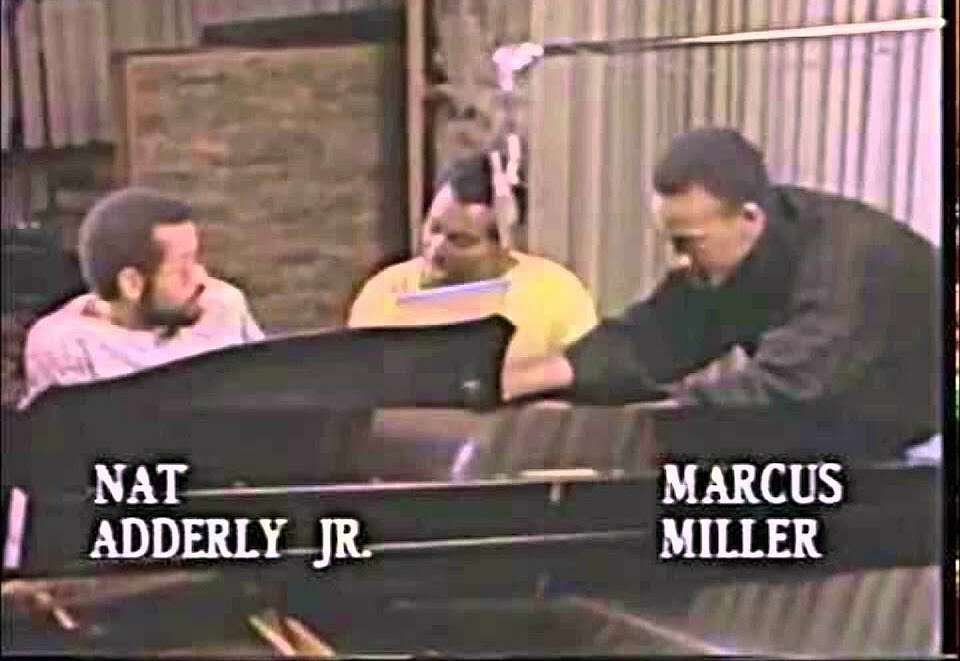
Another interesting thing: Prince and Miles didn't perform CIPWU? During Miles' appearance at Paisley Park in 1987. Granted, they didn't have to, but it always struck me as odd that they did not, given the opportunity.
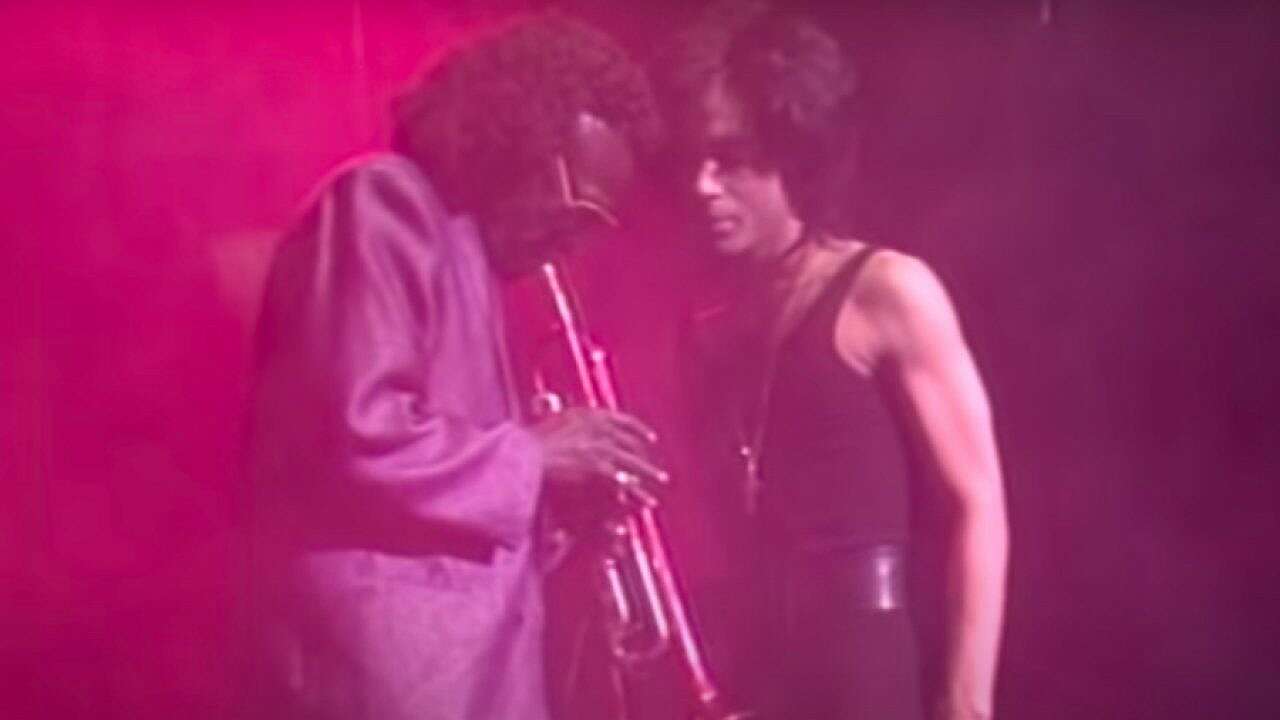
And another interesting thing: days after recording CIPWU? (just after Christmas 1985) a series of instrumentals were recorded that make up the mythic Paisley Jam session: "Madrid", "High Calonic", "Mobile" and more. Some of these songs are real monsters. Why not send these to Miles?
I actually think the problem with CIPWU? lies in Prince not really collaborating with Miles. To be fair, Miles reportedly didn't go to the studio as much during this time, but Prince had a well-established track record of how he gave songs to artists (usually vocalists).
Prince's basic pattern was: here's the song; it has my guide vocal on it; sing it that way. Miles was the complete opposite. He famously gave his musicians as little direction as possible and relied on their abilities. And whenever they fell short, he'd cuss them out and then they’d do better.
Still, Prince was onto something when he told Miles they were alike. At their most adventurous, there were stark similarities. Take "Aida" (from The Man with the Horn) for example, played live (and called "Fast Track"). Note the groove.
Now, listen to "Colleen" from the 1999 deluxe box. Prince recorded this a year after "Aida". Again, pay attention to the groove after the first 15 seconds. It fits.
But all that said, CIPWU? didn't actually end their attempt at collaborating. Some of it extended to the stage where Miles had already been incorporating Prince into his set list. During his tour in support of Tutu, Miles could be heard adding "A Love Bizarre" and "America" into the arrangement.
He would also add the unreleased "Movie Star" (which name checks CIPWU? in the lyrics). No idea why he didn't record this; I don't think Prince would have refused the request.
And in 1991, Prince submitted three songs from the unreleased Madhouse 24 sessions to Miles: “17 (Penetration)”, “19 (Jailbait)” and “20 (A Girl and Her Puppy)”. While Miles recorded these songs with his band (which included Kenny Garrett on sax), they remain unreleased.
Lastly, there are two Miles-related songs of note. The first is "A Couple of Miles" – recorded the same day as CIPWU? but not intended for Miles.
The other is "Letter4Miles" or "Miles is not Dead" which Prince recorded two days after Miles passed in September 1991. I'm sure it's floating somewhere on the Internet, but if you can imagine a melancholy "Strollin'" from Diamonds and Pearls, you'd have a good frame of reference.
And that's a wrap — thanks for reading.